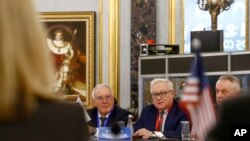Delegations from the United States and Russia are meeting in Vienna Monday and Tuesday to discuss their nuclear arsenals after more than a year’s pause.
The delegations did not make any statements to reporters, when they arrived at the Niederoesterreich Palace in Vienna at 8:30 am local time.
President Donald Trump has abandoned several U.S. treaties with Russia, including ones on overflights and on intermediate-range nuclear forces.
Special Presidential Envoy for Arms Control Ambassador Marshall Billingslea is leading the U.S. delegation for the talks with their Russian counterparts led by Russian Deputy Foreign Minister Sergey Ryabkov. They are to discuss mutually agreed topics related to the future of arms control, the State Department said in a statement last week.
Trump has said China should be involved in the talks on New START, arguing that up until now Beijing has done as it liked in developing its weapon systems.
“The United States has extended an open invitation to the People’s Republic of China to join these discussions, and has made clear the need for all three countries to pursue arms control negotiations in good faith,” the State Department statement said.
The Chinese government has refused the invitation with its Foreign Ministry saying earlier this month that “the time is not yet ripe for China to participate in nuclear disarmament negotiations.”
Billingslea replied in a tweet: “China … should reconsider. Achieving Great Power status requires behaving with Great Power responsibility. No more Great Wall of Secrecy on its nuclear buildup. Seat waiting for China in Vienna.”
The U.S.-Russia New START treaty agreed upon in 2010 limits each side to 1,550 deployed nuclear warheads. It expires in February 2021.
Arms experts say the time is too tight to renew a complex deal between the United States and Russia, let alone to negotiate and craft a new treaty involving China, with the U.S. presidential election is quickly approaching.





